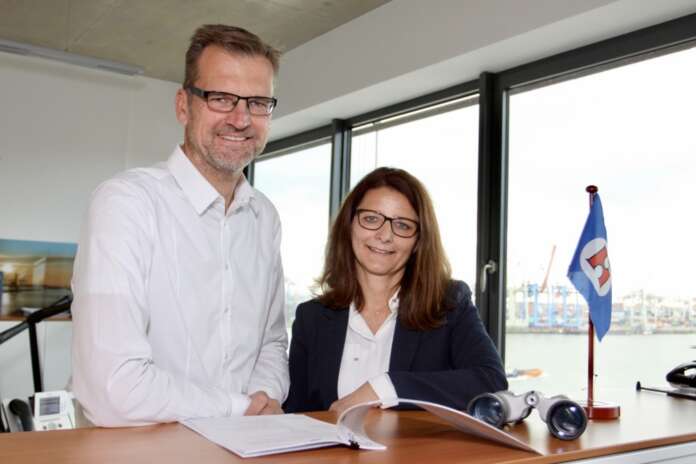
Earnings prospects for liner operators remain good and should keep the container ship charter market on a firm path, say managing directors Claudia Paschkewitz and Michael Zankl of Hanse Bereederung. The chartering outfit [ds_preview]of Schoeller Holdings sees only limited opportunities, though, for multipurpose tonnage in box trades.
Ongoing increases in container ship period rates make people rub their eyes. How much longer can the rallye be sustained?
HB: The chance of further charter rate increases seems limited. However, based on current demand for long-term periods basis forward dates (2–3 year durations even for feeder class ships), there is no turning point on the horizon yet. The speed of increases might slow down during the second half but the market is likely to stay firm for the rest of 2021. In any case, as owner’s brokers, it‘s important to be watchful and select the right partners. We want to minimise any surprises if new market imbalances and stresses emerge, i.e. freight rates dropping after ships got fixed at higher t/c levels.
Fixing long (for less) or just short and wait for the market to climb higher? Play safe or run the risk…?
HB: As specialists in boxships and multipurpose (MPP) vessels, we believe a good mix of short and long charter periods always pays out. But as the markets have endured difficult times for 12 years or so, it’s better to play safe in general and give preference to longer periods. We were not anticipating today’s rate levels only a year ago, so it is unnecessary to fix everything at peak levels which is impossible anyway. Our advice is to fix long-term on reasonably good terms and be prudent about future redelivery time and areas. For our clients on the liner side, spot freights will drop to normal levels, but contract rates will be much higher and these better term-rates will ensure carriers enjoy an even more profitable 2021.
The orderbook is growing again: 1.7 mill. TEU ordered in just 4 months mainly by liners. This must be reason for tramp owners to get a little nervous…?
HB: We never get nervous. After years of restraint, it’s logical that newbuilding ordering starts again in this improving market. However, most orders involve larger units outside our operating sectors as small feeder tramp owners. Investment decisions for tramp owners are more difficult. Fuels of the future will be key also for the success of the investment. However, at this stage it is unclear what the ‘fuel of the future’ will be. LNG, hydrogen, ethanol or something else, we have to wait and see. This uncertainty makes it difficult for tramp owners to choose the right ship and place orders.
Do you expect more MPP ships to join container services? Something you look into?
HB: We have been looking into this as competitive brokers for other owner friends. However, we don‘t see a realistic need for MPPs in container trades. There are too many negative aspects to MPPs such as non-cellular holds, low speed, gear hindering operations etc.. Consequently, MPPs will only take container cargoes in certain overflow instances from A to B. In general they are not a workable option for period charter. In general they are not a workable option for period charter. We don‘t share the myth of great opportunities for MPPs in the container world.
Port congestion, corona, restrictions for crew changes – how has the operations side of chartering changed?
HB: COVID-19 brought its challenges, not least when it comes to crew changes which made life complicated for the industry. We at HANSE have looked at the charter parties and included where possible the option to deviate to alternative ports for necessary crew changes. We also work hard to keep deviation and off-hire times as short as possible. As most of our ships are on time charter, port congestion is more of a headache for charterers. But if a charter period ends, it can be a problem for owners, too, if they have to meet the next delivery date or a time-window for dry-docking. It makes planning more difficult.



















